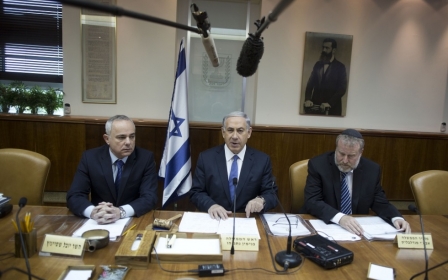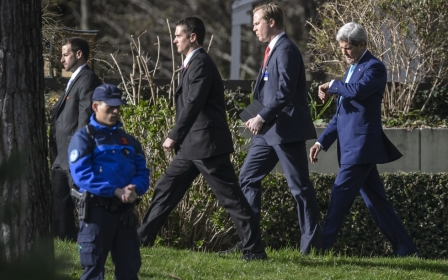Iran, Western powers announce nuclear 'understanding'

Shortly after Iran and world powers announced a framework agreement on Thursday, US President Barack Obama challenged Congress to approve the agreement or face the world's blame for its breakdown.
"The issues at stake are bigger than politics," Obama said, speaking from the White House lawn. "These are matters of war and peace."
If the agreement is finalised and implemented, Obama said he was convinced "it will make our countries, our allies and our world safer."
After eight days of talks, Iran and world powers announced they had reached an agreement on "key parameters" of a potentially historic deal that would bring an end to 12 years of economic sanctions against Iran.
Iranian President Hassan Rouhani said the drafting of an agreement would begin immediately, after marathon talks in the Swiss city of Lausanne.
The text of a binding agreement "is to finish by June 30th" Rouhani added in a tweet sent minutes before a joint statement between Iran and the P5+1 group of leading nations was to be made in Lausanne.
US Secretary of State John Kerry tweeted it was a "big day" and that the global powers and Iran "now have parameters to resolve major issues on nuclear program. Back to work soon on a final deal".
His comments were echoed by European powers.
EU foreign policy chief Federica Mogherini hailed "good news" at the talks and said that Iran's capacity to enrich uranium would be "reduced".
The German foreign ministry said an "understanding had just been reached on key points" of an accord.
Later, Mogherini and Iranian Foreign Minister Javad Zarif spoke at a press conference in Switzerland, giving an outline of the newly reached parameters which include:
- Fordow enrichment plant to be transformed into a nuclear physics research centre
- Arak heavy water plant to be rebuilt so it cannot produce weapons-grade plutonium
- Iran to slash nuclear centrifuges from 19,000 to 6,000
- All economic sanctions against Iran to be lifted once Iran fulfils obligations under agreement
- Iran to be limited to just one nuclear facility at Natanz
- UN to terminate all previous resolutions sanctioning Iran, and to incorporate other restrictions for an agreed-upon period, according to Thursday's announcements – UN to vote on the final agreement with Iran
- Iran to continue nuclear research and development at four nuclear plants
- Iran agrees not to enrich uranium above 3.67 percent for at least 15 years - majority of Iran’s enriched uranium stockpiles to be destroyed
- Spent fuel to be shipped out of Iran
- Iran not to build any new facilities to enrich uranium for at least 15 years
- Sanctions regarding human rights violations and ballistic missile programme to remain in place
- IAEA inspectors to have regular access to all nuclear facilities and nuclear supply chain
Late Thursday, Obama assured Middle East allies that progress on Iran's nuclear talks wouldn't diminish concerns about the republic.
Obama called Israel's Prime Minister Benjamin Netanyahu and Saudi King Salman bin Abdulaziz to discuss the deal.
Obama assured the leaders about the U.S.'s commitment to the concerns about "Iran’s destabilizing activities in the region" and its "threats towards Israel," according to a White House statement.
The talks passed their final deadline at midnight on 29 March, but all sides in the negotiations decided to press on and forge the deal, which aims to curb Iran’s ability to produce weapons in return for lifting a spider-web of complex sanctions that has crippled Iran’s economy in recent years.
Key technical points had blocked a deal in the final crunch days of talks – there was late disagreement over the legal framework governing the economic sanctions, which the Western powers wanted to keep in place, sources told MEE.
Any deal or framework agreement will still have to be approved by the US Congress, where the issue has divided Republicans and Democrats, with the right-wing Republicans vowing to oppose the terms of a deal.
'Winter is over'
News of the agreement was greeted with excitement among many inside Iran, where crippling economic sanctions have been in place for 36 years.
Iranian state television aired Obama's speech live, marking a first for media in the country - many Iranians took pictures of themselves in front of their television screens to mark the historic moment. Hundreds of Iranians took to the streets of Tehran in celebration after the agreement was announced, with drivers sounding their horns in approval along the capital's longest street, Val-e-Asr Avenue.
Many Iranians had spent the day outside on "Nature Day," the 13th day of Persian New Year on which it is considered bad luck to stay inside.
When the announcement was made in Lausanne, many Iranians congratulated each other on the deal on social media. Many quoted the lyrics of the traditional song Winter is Over, which became popular during the 1979 Islamic Revolution and was again circulated by activists from the Green Movement, the 2009 uprising against former President Mahmoud Ahmedinejad after he won what many said was a rigged election.
Analysts speculated that many would welcome the deal, speculating that it would boost the popularity of President Rouhani's government.
Mohammad Ali Shabani, a Middle East expert at the University of London, wrote that the deal had been cleared by Iran's Supreme Leader Ali Khamenei, meaning that any criticism of the deal could be construed as criticism of the cleric.
Stay informed with MEE's newsletters
Sign up to get the latest alerts, insights and analysis, starting with Turkey Unpacked
Middle East Eye delivers independent and unrivalled coverage and analysis of the Middle East, North Africa and beyond. To learn more about republishing this content and the associated fees, please fill out this form. More about MEE can be found here.




